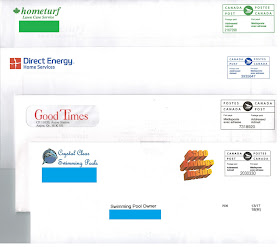From the mid-1980s to at least 2000, Canada Post competed with private companies for a piece of the direct-mail printing business. This type of mail is commonly referred to as junk mail. "Volume Electronic Mail" was the name given to Canada Post's direct-mail printing and delivery service.
Volume electronic mail used businesses' own computerized mailing lists transferred to post office computers over telephone lines. The post office's computerized machines printed clients' letters and notices using their own forms, letterhead paper or logos. Other machines folded the printed letters, added inserts such as return envelopes, stuffed and sealed the envelopes, and sorted them into piles according to mail delivery routes. (Calgary Herald, Jan 17, 1990)
An example of the type of business mail sent by electronic mail was provided in the Calgary Herald article. Petro-Canada was using the service twice a month to distribute lists of cancelled credit cards to its estimated 4,000 gas stations across the country.
Canadian Blood Services Electronic Mail 1998
In 1998, I received an important-looking envelope from Canadian Blood Services with the impressive indicium "ELECTRONIC MAIL PAID". A mail recipient could easily have concluded that this postal service was more costly and had been delivered more quickly than if sent by regular letter mail, which was not the case.
This does not look like junk mail (excuse me, "advertising distribution mail").
The indicium suggests FAST delivery
There was no indication that Canada Post did the printing work rather than the Canadian Blood Services' own private printing company. Contents included a cover letter with my name and address printed so as to appear in the window envelope when the letter was folded, and two inserts describing the new organization. Canadian Blood Services was announcing that it was going to take over the operation of Canada's blood supply system from the Red Cross later that year.
Cover letter
The letter is NOT dated.
Two inserts in addition to the cover envelope
Electronic Mail Envelopes
Some of the different envelopes used to convey electronic mail are shown below. Note the changes in the indicia from 1989 to 1997.
1989 Printing
1992 Printing
1993 Printing
1995 Printing
1997 Printing
Electronic Mail Indicia
1989
1992
1993
1995
1997
Business Reply Envelopes
Canada Post included Business Reply Envelopes in the mailing if requested by the client.
Electronic Mail Centres
Electronic Mail Centres were established in several cities, including the following:
Unitel Electronic Mail
In May, 1990, CNCP Telecommunications changed its name to Unitel. The Unitel cover shown below has a rectangular electronic mail indicium.
Unitel corner card on this electronic mail cover
Not as impressive as the indicia shown above
Electronic mail service was terminated after 2000. I do not know when the mail centres were closed. I would appreciate hearing from readers who could provide additional information about the service.
Addressed Admail 2013
Canada Post's current direct-mail service is called Admail. Unlike electronic mail, Canada Post is not involved in the production of the mailing but works cooperatively with mail service companies which it lists on its website (Partners Directory).
In addition to payment received for the mailing of each item, Canada Post also generates revenue by renting mailing lists to customers, a service promoted on the Canada Post website:
From our database of more than 13 million available Canadian addresses, we’ll generate a mailing list based on your specific targeting requirements. You can even advertise to the neighbouring addresses of your best customers, while making sure that current customers aren’t part of the same campaign.
Addressed Admail indicium
From my mailbox, March 26, 2013:























